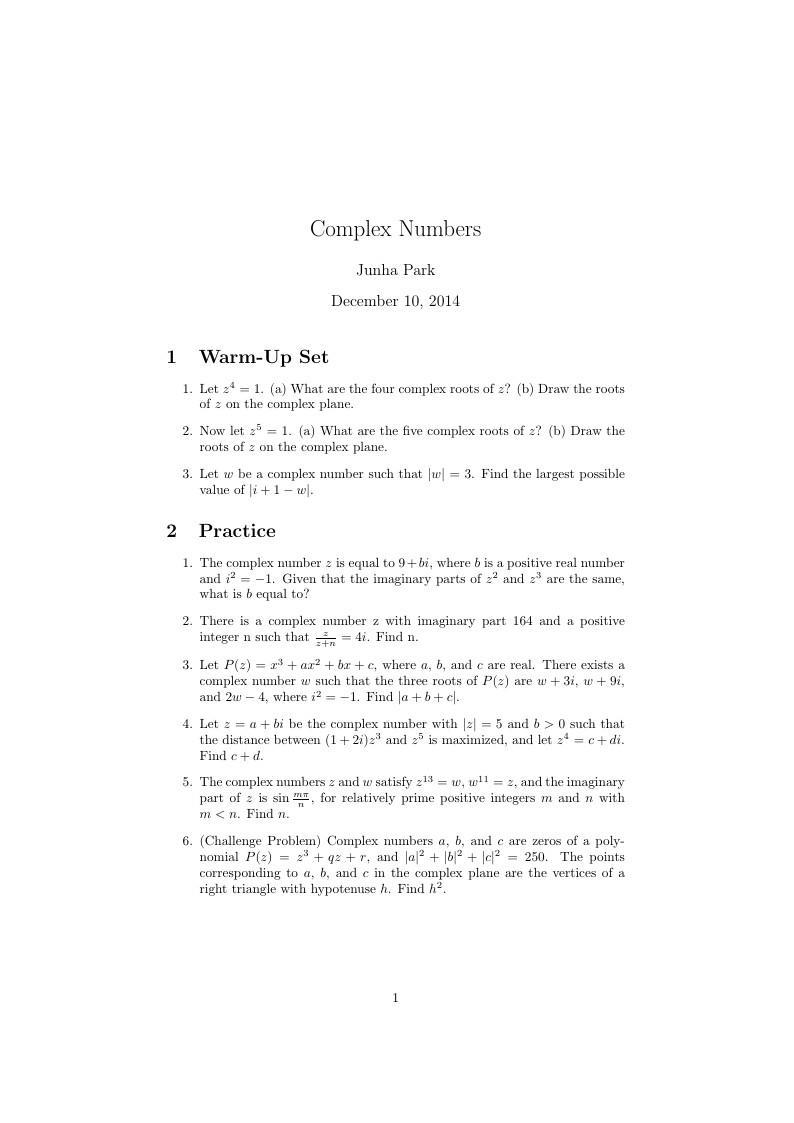
Complex Numbers
Author:
Junha Park
Last Updated:
11年前
License:
Creative Commons CC BY 4.0
Abstract:
Simple problem set involving complex numbers.

\begin
Discover why over 25 million people worldwide trust Overleaf with their work.

\begin
Discover why over 25 million people worldwide trust Overleaf with their work.
\documentclass[a4paper]{article}
\usepackage[english]{babel}
\usepackage[utf8]{inputenc}
\usepackage{amsmath}
\usepackage{graphicx}
\usepackage[colorinlistoftodos]{todonotes}
\title{Complex Numbers}
\author{Junha Park}
\date{\today}
\begin{document}
\maketitle
\section{Warm-Up Set}
\begin{enumerate}
\item Let $z^4$ = 1.
(a) What are the four complex roots of $z$?
(b) Draw the roots of $z$ on the complex plane.
\item Now let $z^5$ = 1.
(a) What are the five complex roots of $z$?
(b) Draw the roots of $z$ on the complex plane.
\item Let $w$ be a complex number such that $|w|$ = 3. Find the largest possible value of $|i + 1 - w|$.
\end{enumerate}
\section{Practice}
\begin{enumerate}
\item The complex number $z$ is equal to $9+bi$, where $b$ is a positive real number and $i^{2}=-1$. Given that the imaginary parts of $z^{2}$ and $z^{3}$ are the same, what is $b$ equal to?
\item There is a complex number z with imaginary part 164 and a positive integer n such that
$\frac {z}{z + n} = 4i$.
Find n.
\item Let $P(z)=x^3+ax^2+bx+c$, where $a$, $b$, and $c$ are real. There exists a complex number $w$ such that the three roots of $P(z)$ are $w+3i$, $w+9i$, and $2w-4$, where $i^2=-1$. Find $|a+b+c|$.
\item Let $z=a+bi$ be the complex number with $\vert z \vert = 5$ and $b > 0$ such that the distance between $(1+2i)z^3$ and $z^5$ is maximized, and let $z^4$ = $c+di$. Find $c+d$.
\item The complex numbers $z$ and $w$ satisfy $z^{13} = w$, $w^{11} = z$, and the imaginary part of $z$ is $\sin{\frac{m\pi}{n}}$, for relatively prime positive integers $m$ and $n$ with $m<n$. Find $n$.
\item (Challenge Problem) Complex numbers $a$, $b$, and $c$ are zeros of a polynomial $P(z) = z^3 + qz + r$, and $|a|^2 + |b|^2 + |c|^2 = 250$. The points corresponding to $a$, $b$, and $c$ in the complex plane are the vertices of a right triangle with hypotenuse $h$. Find $h^2$.
\end{enumerate}
\end{document}